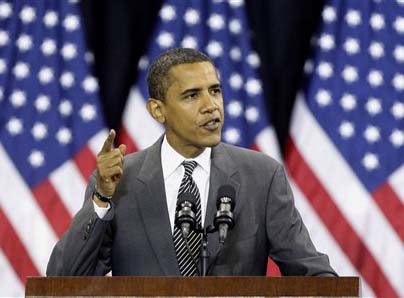Embattled Obama takes economic policy plans on the road
 Washington - Barack Obama, in his first overseas trip as US president next week, will be hoping foreign leaders show more patience for his economic policy prescriptions than he has received back home.
Washington - Barack Obama, in his first overseas trip as US president next week, will be hoping foreign leaders show more patience for his economic policy prescriptions than he has received back home.
Obama leaves for a London summit of the world's 20 major economic powers with much of his domestic policy in a holding pattern, the result of a combination of administration missteps, conservative opposition and a groundswell of public anger against Wall Street.
Just two months into the job, Treasury Secretary Timothy Geithner has faced some calls to resign over a failure to stop US insurance giant American International Group Inc from paying out 165 million dollars in retention bonuses to
73 executives, despite receiving a nearly 180-billion-dollar bail-out from the government.
Some foreign alliances have frayed, too, amid disagreements between the United States and Europe over just how much public spending is needed to pull the global economy out of recession.
But with Obama still receiving goodwill abroad since taking office in January, getting a far-reaching compromise in London "depends on how much political capital he is willing to put into this," said Morris Goldstein, a former top economist at the International Monetary Fund.
"This is Obama's first international meeting. I think it's important that he not only be active but show some leadership," Goldstein, now with the Washington-based Peterson Institute of International Economics, said in an interview.
Obama brings to the April 2 Group of 20 (G20) summit a laundry list of demands: European governments should adopt larger stimulus packages equal to at least 2 per cent of their economic output; the IMF's resources should be tripled to 750 billion dollars to help developing countries; and a new trade financing mechanism should be set up to revive global trade, which could fall this year by the fastest rate in 80 years.
"As aggressive as the actions we are taking have been so far, it's very important to make sure that other countries are moving in the same direction, because the global economy is all tied together," Obama said earlier this month.
Yet the G20's other leaders are expecting Obama to do more to solve a crisis that originated in the US mortgage market, where a combination of risky investments and overheated housing prices nearly brought down the global financial system.
European leaders in particular are pushing for the United States to start implementing broad regulatory reforms to keep better watch on the financial institutions and instruments that have led the world economy into its first contraction since World War II.
The Obama administration has laid out a series of costly initiatives in the run-up to the summit in a bid to revive the US economy and keep its banking system from going under, including a 787-billion-dollar economic stimulus package and a pair of trillion- dollar lending programmes together with the Federal Reserve.
But domestic opposition has slowed the unveiling, and economists fear that public anger over executive bonuses and corruption cases - like Bernard Madoff's 50-billion-dollar fraud - could jeopardize the United States' ability to bring the financial crisis under control.
In a critical report last week ahead of the G20 summit, the IMF warned of a "deeper and prolonged" global recession if the United States could not develop a "comprehensive plan" to end the financial turmoil.
With Wall Street no longer getting the benefit of the doubt, Obama will likely be forced to delay asking Congress for more taxpayer money to help financial firms boost lending to consumers.
His administration has also been under fire for dragging its heels on a detailed plan to stabilize the financial system, where major banks are still teetering on the brink in the face of more than 1 trillion dollars in mortgage-related losses.
The AIG scandal and Obama's own missteps have emboldened opposition Republican lawmakers, who for months have argued that Obama is wasting taxpayer money and running up a huge budget deficit - projected to top 13 per cent of US economic output this year - without making a serious dent in the recession.
Some of the concerns were allayed this week. Geithner on Monday unveiled a 1-trillion-dollar public-private partnership, which was well received by stock markets and is designed to take toxic mortgage assets off the balance sheets of US banks.
The Treasury Department was also set to detail plans for a broader reform of the US regulatory system. That should put all the elements of Obama's economic recovery plan in place, said Goldstein, but whether it's enough "remains to be seen." (dpa)